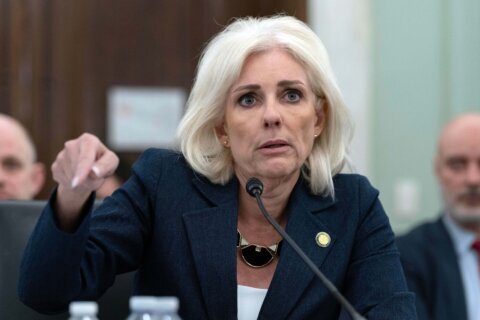The Virginia Department of Health recently announced plans to close community coronavirus testing centers across the state, citing a steep decline in demand and the availability of PCR and rapid antigen tests in the private sector and through government programs.
Community testing sites in Fairfax and Prince William counties are among the nine closed locations. Now, the state will launch a more localized testing initiative that will be run out of mobile vans, said Suzie Trotter, the co-lead of the state department of health’s coronavirus testing program.
Trotter said that the community testing sites that will close were created as part of a partnership with the Federal Emergency Management Agency in December. The locations opened in response to a spike in demand during the omicron surge in December and January. They included sites in Charlottesville, Chesterfield, Fairfax, Fredericksburg, Newport News, Norfolk, Prince William, Richmond and Roanoke.
The closures come as cases in the D.C. region are falling and rapid antigen tests have become available at libraries, retail pharmacies and from the federal government. If cases spike, Trotter said, the department has the option of working with FEMA to reopen the larger-scale testing centers.
“[The van initiative] gives us a broader footprint, and working with the local health director, who can establish that partnership in the community, whether it’s at a library or a flea market,” Trotter said. “The focus is the location would be folks that have had a difficult time accessing tests, whether it’s a mobility issue or there’s low access in the retail market or appointments by doctors.”
Testing demand at the community centers has steadily declined, Trotter said, and public health officials say it’s difficult to gauge the amount of testing done in a community because some people don’t report results of tests completed at home.
For one, the Fairfax County site conducted over 2,000 tests the first week it opened in early January, Trotter said. Last week, it completed 240.
The decline, she said, enables the department to move to its second phased plan, which it’s calling CTC+, and features the mobile vans. The vans will be in operation Tuesday through Saturday from 8 a.m. to 5:30 p.m., Trotter said. Health directors in each county will work with the state to create a weekly schedule for the van.
Local officials will use information, such as vaccination rates, to determine where the van will be scheduled to stop.
“What it can look like on an average day is once the director has communicated with their local partners, say the YMCA needs it for two hours before lunch, then the van can travel to a library in the afternoon,” Trotter said. ” … The schedule may look different every week. We’re trying to maximize our footprint and get out to those areas that need access to testing.”
Trotter said that funding for the state’s testing efforts comes from a long-term Centers for Disease Control and Prevention grant. A FEMA grant, scheduled to end March 31, was also provided to the health department during the omicron surge. The state will have funding through 2023 and partway into 2024.
Even with vaccines widely available, Trotter said testing is critical to ensure everyone knows their status. A list of testing locations is available on the Virginia Department of Health’s website.
“We’re hopeful that surge in demand that we experienced in January is now able to be met in a more routine [way], [in] private health care [and] in the public sector, as well,” Trotter said.
- Sign up for WTOP alerts
- Latest coronavirus test results in DC, Maryland and Virginia
- Latest vaccination numbers in DC, Maryland and Virginia
Looking for more information? D.C., Maryland and Virginia are each releasing more data every day. Visit their official sites here: Virginia | Maryland | D.C.








